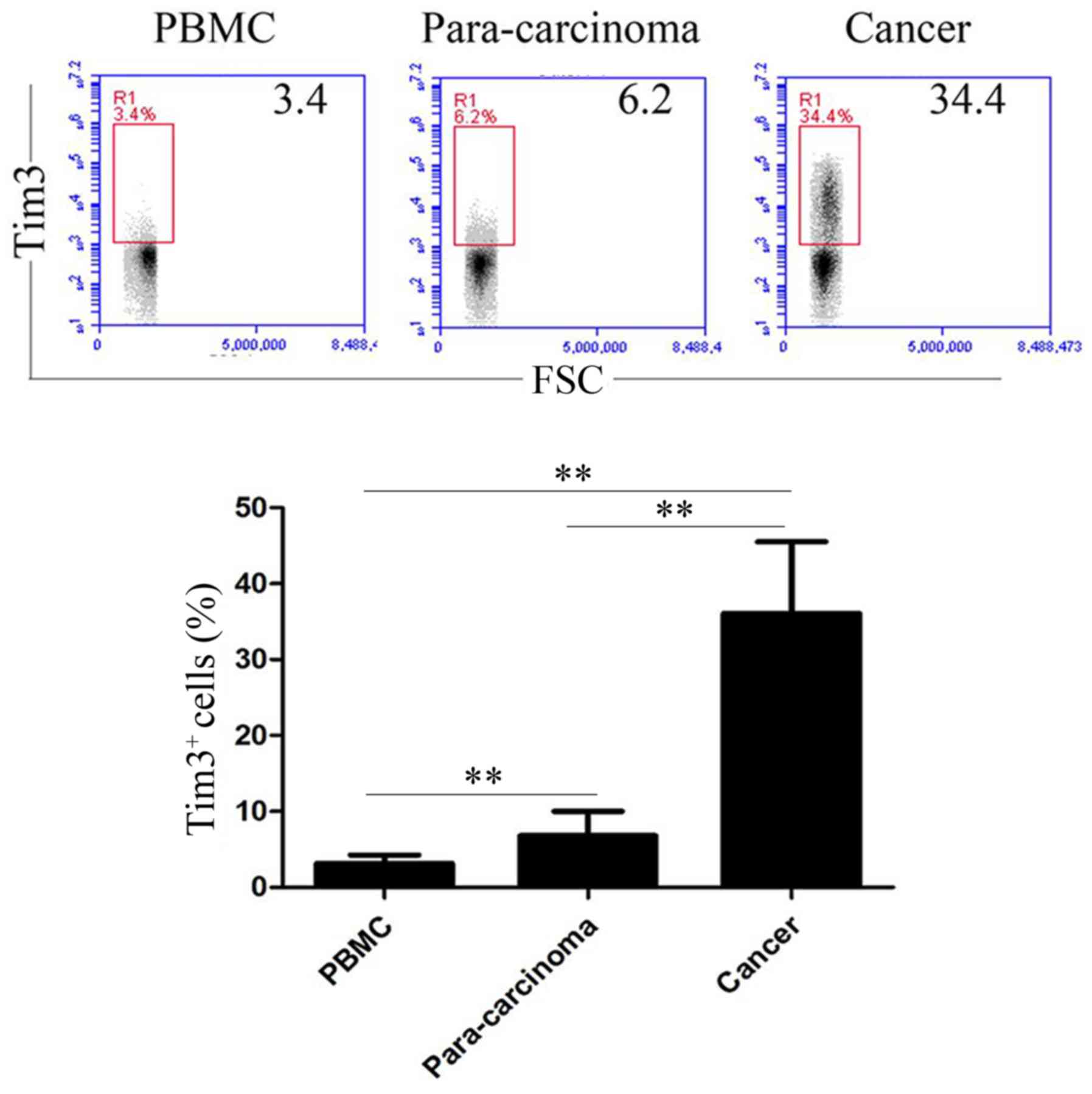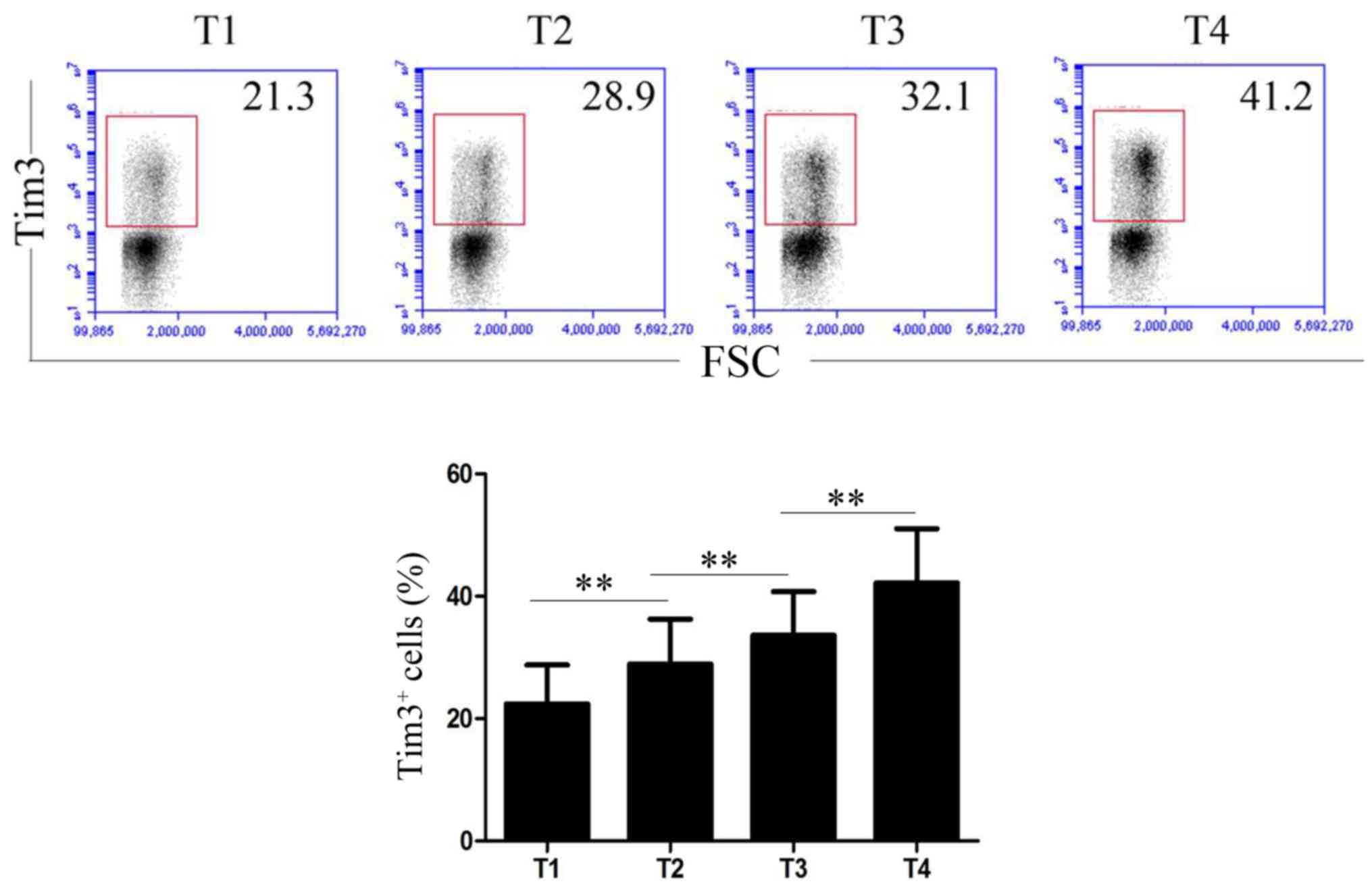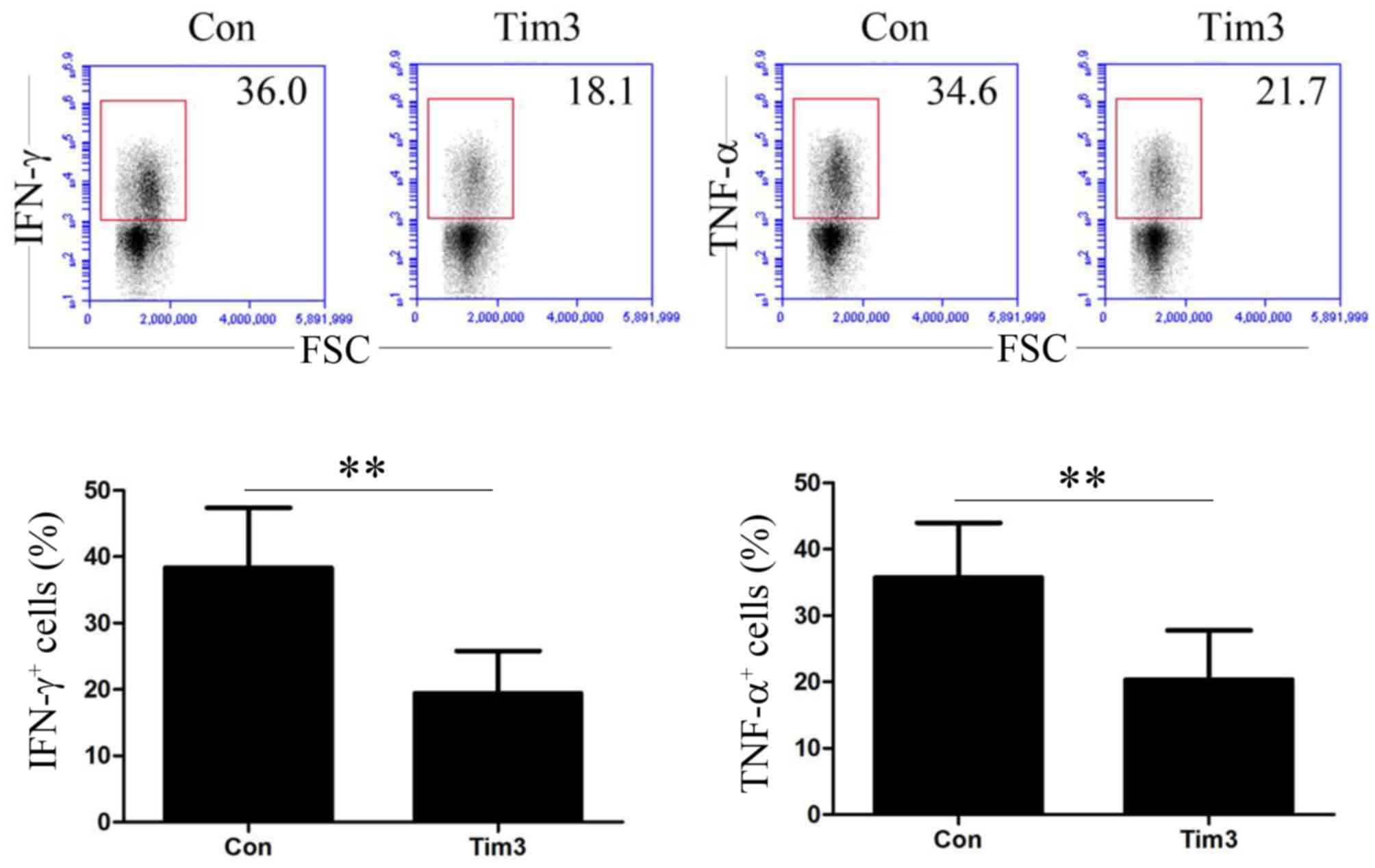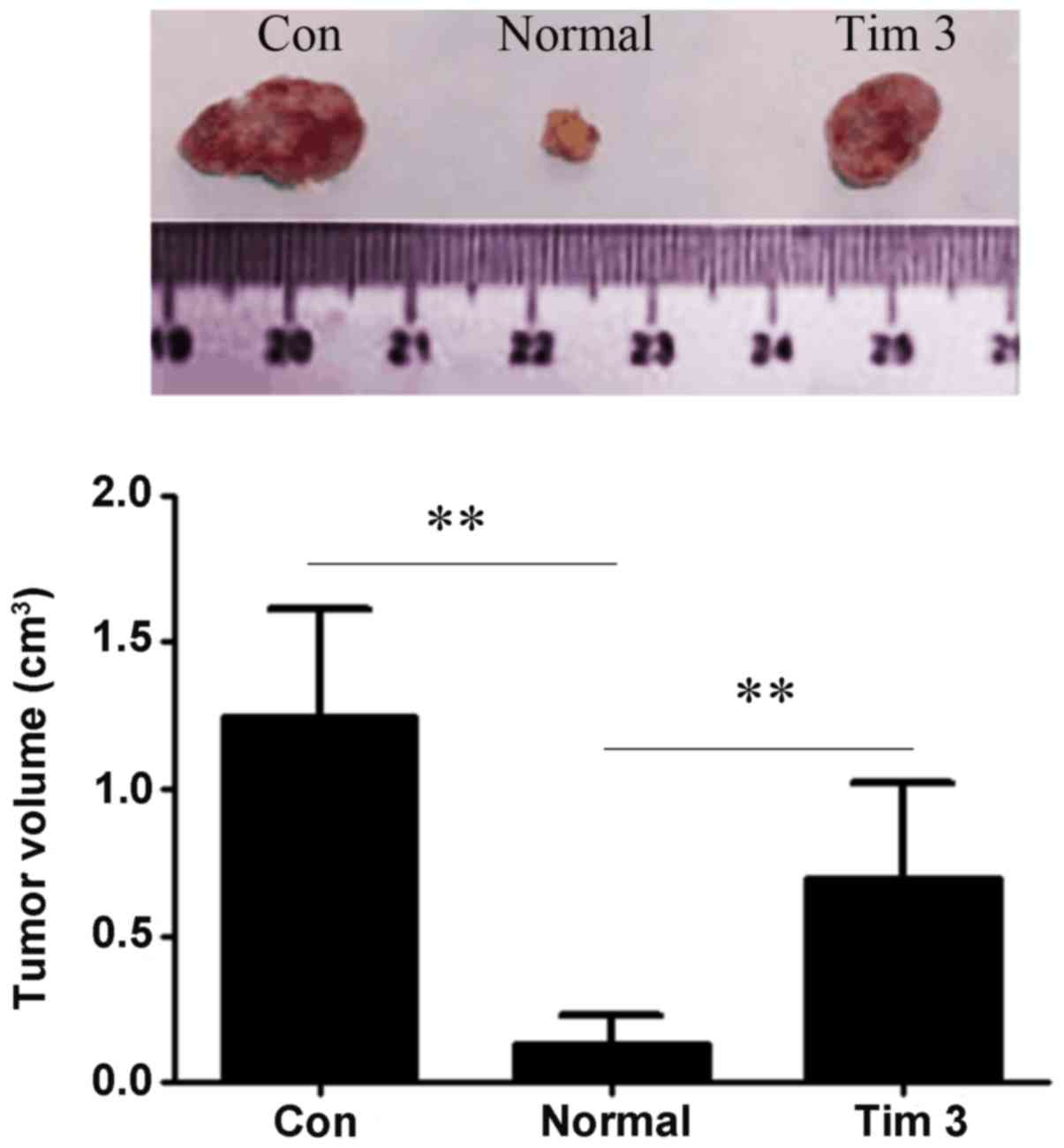|
1
|
Cheng G, Li M, Wu J, Ji M, Fang C, Shi H,
Zhu D, Chen L, Zhao J, Shi L, et al: Expression of Tim-3 in gastric
cancer tissue and its relationship with prognosis. Int J Clin Exp
Pathol. 8:9452–9457. 2015.PubMed/NCBI
|
|
2
|
Jemal A, Bray F, Center MM, Ferlay J, Ward
E and Forman D: Global cancer statistics. CA Cancer J Clin.
61:69–90. 2011. View Article : Google Scholar : PubMed/NCBI
|
|
3
|
Moore MA, Eser S, Igisinov N, Igisinov S,
Mohagheghi MA, Mousavi-Jarrahi A, Ozentürk G, Soipova M, Tuncer M
and Sobue T: Cancer epidemiology and control in North-Western and
Central Asia-past, present and future. Asian Pac J Cancer Prev. 11
Suppl 2:S17–S32. 2010.
|
|
4
|
Qiu MZ, Wang ZQ, Zhang DS, Liu Q, Luo HY,
Zhou ZW, Li YH, Jiang WQ and Xu RH: Comparison of 6th and 7th AJCC
TNM staging classification for carcinoma of the stomach in China.
Ann Surg Oncol. 18:1869–1876. 2011. View Article : Google Scholar : PubMed/NCBI
|
|
5
|
Park JM, Kim JH, Park SS, Kim SJ, Mok YJ
and Kim CS: Prognostic factors and availability of D2 lymph node
dissection for the patients with stage II gastric cancer:
Comparative analysis of subgroups in stage II. World J Surg.
32:1037–1044. 2008. View Article : Google Scholar : PubMed/NCBI
|
|
6
|
Jin Y, Qiu MZ, Wang DS, Zhang DS, Ren C,
Bai L, Luo HY, Wang ZQ, Wang FH, Li YH, et al: Adjuvant
chemotherapy for elderly patients with gastric cancer after D2
gastrectomy. PLoS One. 8:e531492013. View Article : Google Scholar : PubMed/NCBI
|
|
7
|
Takano S, Saito H and Ikeguchi M: An
increased number of PD-1+ and Tim-3+
CD8+ T-cells is involved in immune evasion in gastric
cancer. Surg Today. 46:1341–1347. 2016. View Article : Google Scholar : PubMed/NCBI
|
|
8
|
Hassan SS, Akram M, King EC, Dockrell HM
and Cliff JM: PD-1, PD-L1 and PD-L2 gene expression on t-cells and
natural killer cells declines in conjunction with a reduction in
PD-1 protein during the intensive phase of tuberculosis treatment.
PLoS One. 10:e01376462015. View Article : Google Scholar : PubMed/NCBI
|
|
9
|
Lee KA, Shin KS, Kim GY, Song YC, Bae EA,
Kim IK, Koh CH and Kang CY: Characterization of age-associated
exhausted CD8+ T-cells defined by increased expression
of Tim-3 and PD-1. Aging Cell. 15:291–300. 2016. View Article : Google Scholar : PubMed/NCBI
|
|
10
|
Park HJ, Park JS, Jeong YH, Son J, Ban YH,
Lee BH, Chen L, Chang J, Chung DH, Choi I, et al: Correction: PD-1
upregulated on regulatory T-cells during chronic virus infection
enhances the suppression of CD8+ T-cell immune response
via the interaction with PD-L1 expressed on CD8+
T-cells. J Immunol. 195:5841–5842. 2015. View Article : Google Scholar : PubMed/NCBI
|
|
11
|
Ngiow SF, von Scheidt B, Akiba H, Yagita
H, Teng MW and Smyth MJ: Anti-TIM3 antibody promotes T cell
IFN-γ-mediated antitumor immunity and suppresses established
tumors. Cancer Res. 71:3540–3551. 2011. View Article : Google Scholar : PubMed/NCBI
|
|
12
|
Yuan L, Xu B, Yuan P, Zhou J, Qin P, Han
L, Chen G, Wang Z, Run Z, Zhao P, et al: Tumor-infiltrating
CD4+ T-cells in patients with gastric cancer. Cancer
Cell Int. 17:1142017. View Article : Google Scholar : PubMed/NCBI
|
|
13
|
McIntire JJ, Umetsu SE, Akbari O, Potter
M, Kuchroo VK, Barsh GS, Freeman GJ, Umetsu DT and DeKruyff RH:
Identification of Tapr (an airway hyperreactivity regulatory locus)
and the linked Tim gene family. Nat Immunol. 2:1109–1116. 2001.
View Article : Google Scholar : PubMed/NCBI
|
|
14
|
Shakhov AN, Rybtsov S, Tumanov AV,
Shulenin S, Dean M, Kuprash DV and Nedospasov SA: SMUCKLER/TIM4 is
a distinct member of TIM family expressed by stromal cells of
secondary lymphoid tissues and associated with lymphotoxin
signaling. Eur J Immunol. 34:494–503. 2004. View Article : Google Scholar : PubMed/NCBI
|
|
15
|
Markwick LJ, Riva A, Ryan JM, Cooksley H,
Palma E, Tranah TH, Manakkat Vijay GK, Vergis N, Thursz M, Evans A,
et al: Blockade of PD1 and TIM3 restores innate and adaptive
immunity in patients with acute alcoholic hepatitis.
Gastroenterology. 148:590–602. 2015. View Article : Google Scholar : PubMed/NCBI
|
|
16
|
Tao JL, Li LJ, Fu R, Wang HQ, Jiang HJ,
Yue LZ, Zhang W, Liu H, Ruan EB, Qu W, et al: Elevated
TIM3+ hematopoietic stem cells in untreated
myelodysplastic syndrome displayed aberrant differentiation,
overproliferation and decreased apoptosis. Leuk Res. 38:714–721.
2014. View Article : Google Scholar : PubMed/NCBI
|
|
17
|
Roth CG, Garner K, Eyck ST, Boyiadzis M,
Kane LP and Craig FE: TIM3 expression by leukemic and non-leukemic
myeloblasts. Cytometry B Clin Cytom. 84:167–172. 2013. View Article : Google Scholar : PubMed/NCBI
|
|
18
|
Ge RT, Zeng L, Mo LH, Xu LZ, Zhang HP, Yu
HQ, Zhang M, Liu ZG, Liu ZJ and Yang PC: Interaction of TIM4 and
TIM3 induces T helper 1 cell apoptosis. Immunol Res. 64:470–475.
2016. View Article : Google Scholar : PubMed/NCBI
|
|
19
|
Ma Y, Liu X, Zhu J, Li W, Guo L, Han X,
Song B, Cheng S and Jie L: Polymorphisms of co-inhibitory molecules
(CTLA-4/PD-1/PD-L1) and the risk of non-small cell lung cancer in a
Chinese population. Int J Clin Exp Med. 8:16585–16591.
2015.PubMed/NCBI
|
|
20
|
Li Z, Li N, Zhu Q, Zhang G, Han Q, Zhang
P, Xun M, Wang Y, Zeng X, Yang C, et al: Genetic variations of PD1
and TIM3 are differentially and interactively associated with the
development of cirrhosis and HCC in patients with chronic HBV
infection. Infect Genet Evol. 14:240–246. 2013. View Article : Google Scholar : PubMed/NCBI
|
|
21
|
Ngiow SF, Teng MW and Smyth MJ: Prospects
for TIM3-targeted antitumor immunotherapy. Cancer Res.
71:6567–6571. 2011. View Article : Google Scholar : PubMed/NCBI
|
|
22
|
Jayaraman P, Sada-Ovalle I, Beladi S,
Anderson AC, Dardalhon V, Hotta C, Kuchroo VK and Behar SM: Tim3
binding to galectin-9 stimulates antimicrobial immunity. J Exp Med.
207:2343–2354. 2010. View Article : Google Scholar : PubMed/NCBI
|
|
23
|
Bu M, Shen Y, Seeger WL, An S, Qi R,
Sanderson JA and Cai Y: Ovarian carcinoma-infiltrating regulatory
T-cells were more potent suppressors of CD8(+) T-cell inflammation
than their peripheral counterparts, a function dependent on TIM3
expression. Tumour Biol. 37:3949–3956. 2016. View Article : Google Scholar : PubMed/NCBI
|
|
24
|
Oomizu S, Arikawa T, Niki T, Kadowaki T,
Ueno M, Nishi N, Yamauchi A and Hirashima M: Galectin-9 suppresses
Th17 cell development in an IL-2-dependent but Tim-3-independent
manner. Clin Immunol. 143:51–58. 2012. View Article : Google Scholar : PubMed/NCBI
|


















